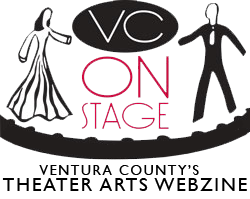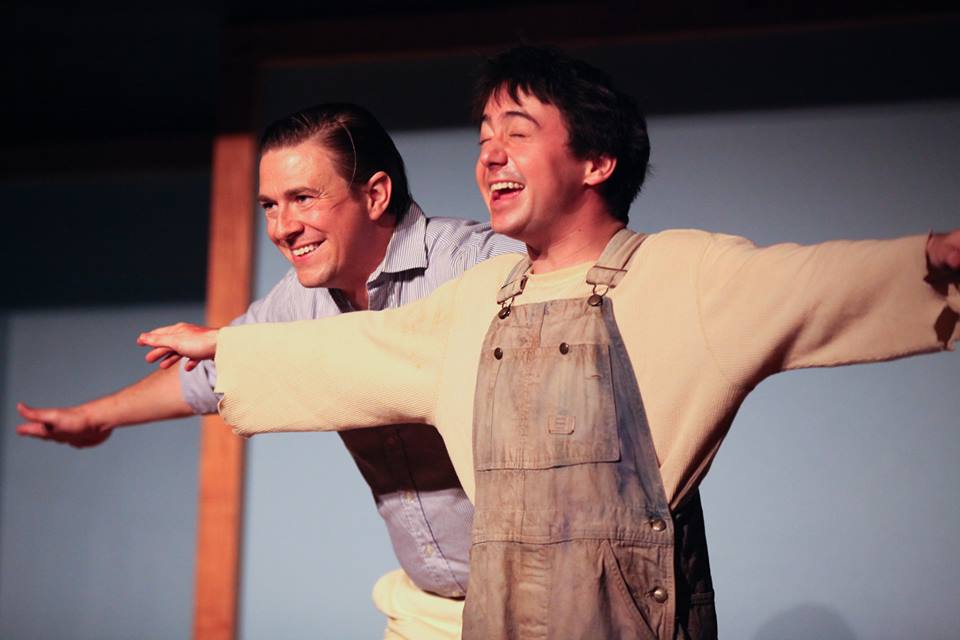REVIEW BY CARY GINELL
Although “The Diviners,” Jim Leonard, Jr.’s morality play on religion, friendship, and tragedy, was written in 1980, it almost seems as if it should have been written during the time it depicts: the barren landscape of the fictional hamlet of Zion, Indiana in the early years of the Depression. The Elite Theatre Company’s production of the play packs an emotional wallop, thanks to an extraordinary cast and sensitive direction by James Castle Stevens.
When watching “The Diviners,” one notices similarities to other works, including John Steinbeck’s “Of Mice and Men,” with the loving friendship of its two mismatched lead characters, N. Richard Nash’s “The Rainmaker,” about a parched town magically revived by a stranger who claims he can make it rain, and “The Miracle Worker,” as an afflicted youngster, who is helped to cope with living a normal life by a devoted parental figure.
The story concerns Buddy, a teenaged boy who nearly drowned in an accident when he was small which killed his mother. Since then, Buddy has become hydrophobic, with an inordinate, horrific fear of water, including ponds, rivers, rain, and even filled washtubs. Ironically, he has also become a kind of idiot savant, who uses a divining rod to locate subterranean water sources and who also can predict when it will rain. Buddy is a hyperactive birdlike creature, flapping his arms like a spastic flamingo. He is fascinated by birds, dreams of flying, and speaks of himself in the third person. Buddy’s emotions are like a weather vane; instantly changing direction with the wind, triggered by attempts to get him to bathe to relieve a serious case of ringworm that he has developed.
Enter C. C. Showers, a disaffected Bible-thumping preacher who has left the church to wander the countryside, in search of a new identity. C. C. and Buddy form an unusual kinship, as C.C. attempts to explain to Buddy what happened to his mother and to also try and coax him into exorcising his fear of water. It is this unlikely friendship that brings to mind the similar relationship between George and Lennie in “Of Mice and Men.” Lennie/Buddy are unable to control their behavior, despite C. C./George’s attempts to not only help them live in a normal world, but to protect them from harm.
Twenty-three-year-old Michael Beck is nothing short of brilliant in his portrayal of Buddy. The role was the first he played when he began acting just two short years ago. VC On Stage interviewed him after he appeared in his first musical, Camarillo Skyway Playhouse’s production of “Cabaret,” in which he played Cliff. (see our story of August 7, 2013).
Beck completely disappears into his character. “I don’t wanna sit still,” says Buddy, and Beck is a whirling dervish of nervous activity, eyes darting about and limbs constantly in motion. The audience gasps in wonder when Beck effortlessly chug-a-lugs two full bottles of root beer in succession. Now that’s acting. When he is physically dragged to a washtub, we sense his utter panic and anxiety; nothing is held back in Beck’s performance. It is simply a marvel to watch him work.
No less effective is Andrew David James’ charismatic and sympathetic performance as C. C., whose faith has dissipated in the face of the stultifying Depression. His statement, “Thinkin’ and preachin’ don’t mix,” reflects the repressed attitudes of the townsfolk of Zion, whose blind, religious zealotry is the real cause of the tragedy that is displayed at the show’s climax.
Jessamyn Arnstein is wonderful as Buddy’s protective and caring younger sister Jennie Mae, who at sixteen, is too young for love (she has a teenage crush on C. C.) and too young to be a mother (it is left to her to care for and watch over Buddy to make sure he doesn’t get in trouble.). The rest of the cast is exemplary in their respective roles, especially Andy Brasted as Buddy and Jessie Mae’s short-tempered father Ferris, who can’t bring himself to help Buddy, even when it is for his own good, and Larry Swartz as Basil, a farmer who longs for the days when impersonal technology and automobiles didn’t exist.
The music is appropriately dominated by sacred tunes such as “Rock of Ages” and “Amazing Grace,” although in one sequence, C. C. and Jennie Mae get Buddy to sing “You Are My Sunshine” as a distraction as they wash his itching feet in epsom salts. (“Sunshine” wasn’t published until 1939, long after the end of the Hoover Administration, which is when the show is supposed to take place. It should be noted that “You Are My Sunshine” was selected by the play’s author.)
“The Diviners” is not just about Buddy’s ability to “divine” water sources. Searching is the overriding theme in the play, which is hinted at by the plural word in the show’s title. “Divining” is simply a metaphor then for all the characters in the play. The townsfolk are searching for a new religious figurehead for their abandoned church (with C.C. their reluctant target), and like Jennie Mae, C.C. is searching for his own identity.
“The Diviners” is an emotionally rich, beautifully performed show and is not to be missed. It plays through November 17 at the Elite Theatre Company in Oxnard. For dates and showtimes, see the VC On Stage Calendar.






No Comments